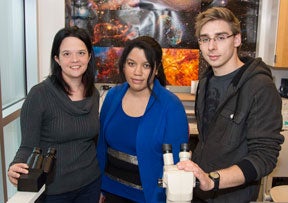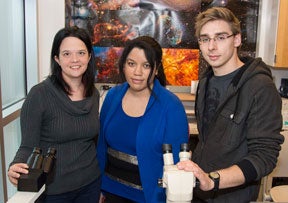 KINGSTON, R.I. – February 26, 2016 – When faculty in the University of Rhode Island’s Department of Cell and Molecular Biology reorganized the program in 2013 to appeal to a wider variety of students, they expected an increase in enrollment but had no idea that the program would quickly become one of the fastest growing academic programs offered by the University.
KINGSTON, R.I. – February 26, 2016 – When faculty in the University of Rhode Island’s Department of Cell and Molecular Biology reorganized the program in 2013 to appeal to a wider variety of students, they expected an increase in enrollment but had no idea that the program would quickly become one of the fastest growing academic programs offered by the University.
Prior to the reorganization, the program enrolled fewer than 10 students in each freshman class and, with the addition of students who transferred into the program as upperclassmen, graduated about 20 to 25 undergraduate students each year. This year more than 40 freshmen enrolled in the program and the total number of students majoring in the discipline has topped 180.
According to Professor Gongqin Sun, chairman of the department, previously students could only focus their studies on microbiology, but the revised program now offers tracks in biochemistry and biotechnology as well, two disciplines that have attracted a great many students due to potential career options in medicine, pharmaceuticals, biotechnology and medical research.
“Microbiology focuses primarily on the narrow world of microbes, like bacteria and viruses, while biochemistry examines all organisms, with an emphasis on higher organisms like humans,” he said. “Biotechnology focuses on the applications of biological tools and knowledge.”
Catherine Garcia is one of many URI students planning a career in medicine who chose the biochemistry track in the new cell and molecular biology major because it prepares students well for medical school.
A senior from Providence, she has already been accepted to the Alpert Medical School at Brown University through the URI/Brown Early Identification Program, and she attributes her successful application in part to the new program in cell and molecular biology. She said she especially liked learning about the molecular basis of diseases, something she would not have studied in any other undergraduate program at URI.
“The things I learned in my biochemistry class were some of the same things my sister was learning in medical school,” said Garcia. “I originally wanted to be a cardiothoracic surgeon and travel to Third World countries to provide medical services to those in need, but now I’m debating also going for a Ph.D. in biochemistry to become a teacher as well.”
Junior Adam Sokolowski is also in the biochemistry track and considering a career as a physician’s assistant. The Southington, Conn., resident is an emergency medical technician and works for the URI ambulance corps about 30 hours each week, so he has a good head start on his career ambitions.
“I like the new structure of the program,” he said. “I started out as a microbiology major but changed to biochem because I found it more interesting and applicable. I have a great deal of interest in health care and medicine, and I’m also trying to find other possible career pathways to expand my options for the future.”
Sokolowski said he also appreciates how easy it is to get assistance from professors and advisors in the Department of Cell and Molecular Biology, something that junior Gail Leyare has found especially useful.
A 30-something former police officer from Warren, Leyare was diagnosed with a brain aneurysm in 2011 that required brain surgery. The experience inspired her to go back to school and eventually conduct research on brain and vascular diseases. But it hasn’t been easy.
“I had an unplanned, emergency surgery that kept me home for three weeks last November,” she said. “My professors showed great understanding in my situation, giving me the time I needed to complete my work. One even went out of his way to meet me outside the University – I couldn’t travel – to tutor me on what I had missed. Their understanding, help and my own hard work allowed me to finish with all A’s for the semester.”
In addition to the creation of several new courses for the major, the rapid increase in student enrollment in the revised program has spurred a need for additional faculty. Two new faculty members were hired in the last four years, and four more are expected to be hired in the coming year.
For more information about the program, contact Gongqin Sun at gongqinsun@uri.edu or 401-874-5937.
Pictured above: URI students studying cell and molecular biology, one of the fastest growing academic programs at the University, include (left to right) Gail Leyare, Catherine Garcia and Adam Sokolowski. (URI photo by Nora Lewis)

